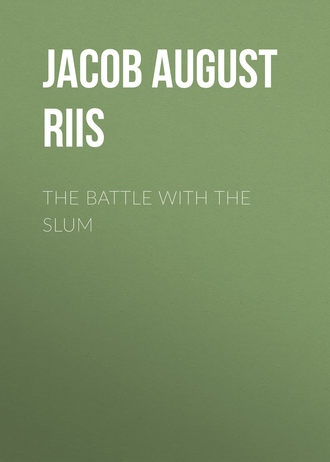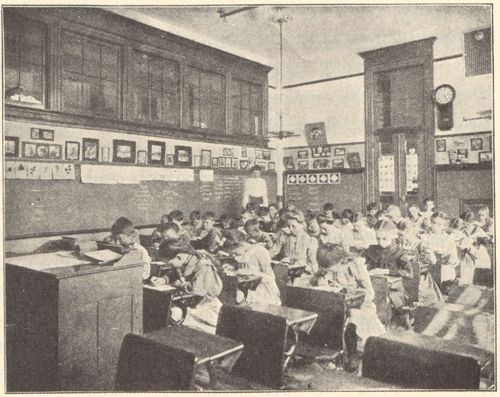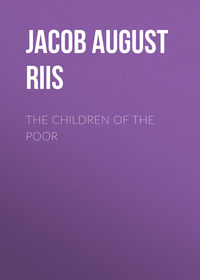 полная версия
полная версияThe Battle with the Slum
"And how about the schools for the good boys in your town?" I asked, when I had heard him out. "Are they anything to be proud of?"
He stared. He guessed they were all right, he said, after some hesitation. But it was clear that he did not know.

The Old.

The New.
It is not necessary to go back forty years to find us in the metropolis upon the clergyman's platform, if not upon Madame Bruin's. A dozen or fifteen will do. They will bring us to the day when roof playgrounds were contemptuously left out of the estimates for an East Side school, as "frills" that had nothing to do with education; when the Board of Health found but a single public school in more than sixscore that was so ventilated as to keep the children from being poisoned by foul air; when the authority of the Talmud had to be invoked by the Superintendent of School Buildings to convince the president of the Board of Education, who happened to be a Jew, that seventy-five or eighty pupils were far too many for one classroom; when a man who had been dead a year was appointed a school trustee of the Third Ward, under the mouldy old law surviving from the day when New York was a big village, and filled the office as well as if he had been alive, because there were no schools in his ward—it was the wholesale grocery district; when manual training and the kindergarten were yet the fads of yesterday, looked at askance; when fifty thousand children roamed the streets for whom there was no room in the schools, and the only defence of the School Commissioners was that they "didn't know" there were so many; and when we mixed truants and thieves in a jail with entire unconcern. Indeed, the jail filled the title rôle in the educational cast of that day. Its inmates were well lodged and cared for, while the sanitary authorities twice condemned the Essex Market school across the way as wholly unfit for children to be in, but failed to catch the ear of the politician who ran things unhindered. When (in 1894) I denounced the "system" of enforcing—or not enforcing—the compulsory education law as a device to make thieves out of our children by turning over their training to the street, he protested angrily; but the experts of the Tenement House Commission found the charge fully borne out by the facts. They were certainly plain enough in the sight of us all, had we chosen to see.
When at last we saw, we gave the politician a vacation for a season. To say that he was to blame for all the mischief would not be fair. We were to blame for leaving him in possession. He was only a link in the chain which our indifference had forged; but he was always and everywhere an obstruction to betterment,—sometimes, illogically, in spite of himself. Successive Tammany mayors had taken a stand for the public schools when it was clear that reform could not be delayed much longer; but they were helpless against a system of selfishness and stupidity of which they were the creatures, though they posed as its masters. They had to go with it as unfit, and upon the wave that swept out the last of the rubbish came reform. The Committee of Seventy took hold, the Good Government Clubs, the Tenement House Commission, and the women of New York. Five years we strove with the powers of darkness, and look now at the change! The New York school system is not yet the ideal one,—it may never be; but the jail, at least, has been cast out of the firm. We have a compulsory education law under which it is possible to punish the parent for the boy's truancy, as he ought to be if there was room in the school for the lad, and he let him drift. And the day cannot be delayed much longer now when every child shall find the latchstring out on the school door. We have had to put our hands deep into our pockets to get so far, and we shall have to put them in deeper yet a long way. But it is all right. We are beginning to see the true bearing of things. Last week the Board of Estimate and Apportionment appropriated six millions of dollars for new schools—exactly what the battleship Massachusetts cost all complete with guns and fittings, so they told me on board. Battleships are all right when we need them, but even then it is the man behind the gun who tells, and that means the schoolmaster. The Board of Education asked for sixteen millions. They will get the other ten when we have caught our breath. Since the beginning of 189537 we have built sixty-nine new public schools in Manhattan and the Bronx, at a cost of $12,038,764, exclusive of cost of sites, furnishings, heating, lighting, and ventilating the buildings, which would add two-thirds at least of that amount, making it a round twenty millions of dollars. And every one of the sixty-nine has its playground, which will by and by be free to all the neighborhood. The idea is at last working through that the schools belong to the people, and are primarily for the children and their parents; not mere vehicles of ward patronage, or for keeping an army of teachers in office and pay.

Public School No. 177, Manhattan.
The silly old régime is dead. The ward trustee is gone with his friend the alderman, loudly proclaiming the collapse of our liberties in the day that saw the schools taken from "the people's" control. They were "the people." Experts manage our children's education, which was supposed, in the old plan, to be the only thing that did not require any training. To superintend a brickyard demanded some knowledge, but anybody could run the public schools. It cost us an election to take that step. One of the Tammany district leaders, who knew what he was talking about, said to me after it was all over: "I knew we would win. Your bringing those foreigners here did the business. Our people believe in home rule. We kept account of the teachers you brought from out of town, and who spent the money they made here out of town, and it got to be the talk among the tenement people in my ward that their daughters would have no more show to get to be teachers. That did the business. We figured the school vote in the city at forty-two thousand, and I knew we could not lose." The "foreigners" were teachers from Massachusetts and other states, who had achieved a national reputation at their work.
There lies upon my table a copy of the minutes of the Board of Education of January 9, 1895, in which is underscored a report on a primary school in the Bronx. "It is a wooden shanty," is the inspector's account, "heated by stoves, and is a regular tinder box; cellar wet, and under one classroom only. This building was erected in order, I believe, to determine whether or not there was a school population in the neighborhood to warrant the purchase of property to erect a school on."

Letter H Plan of Public School No. 165, showing Front on West 109th Street.
That was the way then of taking a school census, and the result was the utter failure of the compulsory education law to compel anything. To-day we have a biennial census, ordained by law, which, when at last it gets into the hands of some one who can count,38 will tell us how many Jacob Beresheims are drifting upon the shoals of the street. And we have a truant school to keep them safe in. To it, says the law, no thief shall be committed. It is not yet five years since the burglar and the truant—which latter, having been refused admission to the school because there was not room for him, inconsequently was locked up for contracting idle ways—were herded in the Juvenile Asylum, and classified there in squads of those who were four feet, four feet seven, and over four feet seven! I am afraid I scandalized some good people during the fight for decency in this matter, by insisting that it ought to be considered a good mark for Jacob that he despised such schools as were provided for him. But it was true. Except for the risk of the burglar, the jail was preferable by far. The woman into whose hands the management of the truant school fell, made out, after little more than a year's experience, that of twenty-five hundred so-called incorrigibles, the barest handful—scarce sixty—were rightly so named, and even these a little longer and tighter grip might probably win over. For such a farm school is yet to be provided. The rest responded promptly to an appeal to their pride. She "made it a personal matter" with each of them, and the truant vanished; the boy was restored. The burglar, too, made it a personal matter in the old contact, and the result was two burglars for one. I have yet to find any one who has paid attention to this matter and is not of the opinion that the truant school strikes at the root of the problem of juvenile crime. After thirty years of close acquaintance with the child population of London, Mr. Andrew Drew, chairman of the Industrial Committee of the School Board, declared his conviction that "truancy is to be credited with nearly the whole of our juvenile criminality." But for years there seemed to be no way of convincing the New York School Board that the two had anything to do with one another. Even now it seems to be a case of one convinced against his will being "of the same opinion still," for, though the Superintendent of Schools speaks of that bar to the jail as preposterously inadequate, nothing is done to strengthen it.
Nothing on that tack. But there is a long leg and a short leg on the course, and I fancy Superintendent Snyder does the tacking on the long leg. Mr. Snyder builds New York's schools, and he does that which no other architect before his time ever did or tried; he "builds them beautiful." In him New York has one of those rare men who open windows for the soul of their time. Literally, he found barracks where he is leaving palaces to the people. If any one thinks this is overmeasure of praise, let him look at the "Letter H" school, now become a type, and see what he thinks of it. The idea suggested itself to him as meeting the demands of a site in the middle of a block, while he was poking about old Paris on a much-needed vacation, and now it stands embodied in a dozen beautiful schools on Manhattan Island, copies, every one, of the handsomest of French palaces, the Hôtel de Cluny. I cannot see how it is possible to come nearer perfection in the building of a public school. There is not a dark corner in the whole structure, from the splendid gymnasium under the red-tiled roof to the indoor playground on the street floor, which, when thrown into one with the two yards that lie enclosed in the arms of the H, give the children nearly an acre of asphalted floor to romp on from street to street; for the building sets right through the block, with just such a front on the other street as it shows on this one. If there be those yet upon whom the notion grates that play and the looks of the school should be counted in as educational factors, why, let them hurry up and catch on. They are way behind. The play through which the child "first perceives moral relations" comes near being the biggest and strongest factor in it all to-day; and as for the five or ten thousand dollars put in for "the looks" of things where the slum had trodden every ideal and every atom of beauty into the dirt, I expect to live to see that prove the best investment a city ever made.
We are getting the interest now in the new pride of the boy in "his school," and no wonder. When I think of the old Allen Street school, with its hard and ugly lines, where the gas had to be kept burning even on the brightest days, recitations suspended every half-hour, and the children made to practice calisthenics so that they should not catch cold while the windows were opened to let in fresh air; of the dark playground downstairs, with the rats keeping up such a racket that one could hardly hear himself speak at times; or of that other East Side "playground" where the boys "weren't allowed to speak above a whisper," so as not to disturb those studying overhead, I fancy that I can make out both the cause and the cure of the boy's desperation. "We try to make our schools pleasant enough to hold the children," wrote the Superintendent of Schools in Indianapolis to me once, and added that they had no truant problem worth bothering about. With the kindergarten and manual training firmly ingrafted upon the school course, as they are at last, and with it reaching out to enlist also the boy's play through playground and vacation schools, I shall be willing to turn the boy who will not come in over to the reformatory. They will not need to build a new wing to the jail for his safekeeping.

Public School No. 153, the Bronx.
All ways lead to Rome. The reform in school building dates back, as does every other reform in New York, to the Mulberry Bend. It began there. The first school that departed from the soulless old tradition, to set beautiful pictures before the child's mind as well as dry figures on the slate, was built there. At the time I wanted it to stand in the park, hoping so to hasten the laying out of that; but although the Small Parks law expressly permitted the erection on park property of buildings for "the instruction of the people," the officials upon whom I pressed my scheme could not be made to understand that as including schools. Perhaps they were right. I catechised thirty-one Fourth Ward girls in a sewing school, about that time, twenty-six of whom had attended the public schools of the district more than a year. One wore a badge earned for excellence in her studies. In those days every street corner was placarded with big posters of Napoleon on a white horse riding through fire and smoke. There was one right across the street. Yet only one of the thirty-one knew who Napoleon was. She "thought she had heard of the gentleman before." It came out that the one impression she retained of what she had heard was that "the gentleman" had two wives, both at one time probably. They knew of Washington that he was the first President of the United States, and cut down a cherry tree. They were sitting and sewing at the time almost on the identical spot on Cherry Hill where he lived when he held the office. To the question who ruled before Washington the answer came promptly: no one; he was the first. They agreed reluctantly, upon further consideration, that there was probably "a king of America" before his day, and the Irish damsels turned up their noses at the idea. The people of Canada, they thought, were copper-colored. The same winter I was indignantly bidden to depart from a school in the Fourth Ward by a trustee who had heard that I had written a book about the slum and spoken of "his people" in it.
Those early steps in the reform path stumbled sadly over obstacles that showed what a hard pull we had ahead. I told in "The Making of an American" how I fared when I complained that the Allen Street school was overrun with rats, and how I went out to catch one of them to prove to the City Hall folk that I was not a liar, as they said. We won the fight for the medical inspection of the schools that has proved such a boon, against much opposition within the profession, from which we should have had only support. And this in face of evidence of a kind to convince anybody. I remember one of the exhibits. There had been a scarlet-fever epidemic on the lower West Side, which the health inspectors finally traced to the public school of the district. A boy with the disease had been turned loose before the "peeling" was over, and had achieved phenomenal popularity in the classroom by a trick he had of pulling the skin from his fingers as one would skin a cat. The pieces he distributed as souvenirs among his comrades, who carried them proudly home to show to their admiring playmates who were not so lucky as to sit on the bench with the clever lad. The epidemic followed as a matter of course. But though the Health Department put through that reform, when it came to inspecting the eyes of the children, we lost. The cry that it would "interfere with private practice" defeated us. The fact was easily demonstrated that not only was ophthalmia rampant in the schools with its contagion, but that the pupils were made both near-sighted and stupid by the want of proper arrangement of their seats and of themselves in their classrooms. But self-interest prevailed. However, nothing is ever settled till it is settled right. I have before me the results of an examination of thirty-six public schools containing 55,470 pupils. It was made by order of the Board of Health this month (August, 1902), and ought to settle that matter for good. Of the 55,470, not less than 6670 had contagious eye-disease; 2328 were cases of operative trachoma, 3243 simple trachoma, and 1099 conjunctivitis. In one school in the most crowded district of the East Side 22.2 per cent were so afflicted. No wonder the doctors "were horrified" at the showing. So was the President of the Board of Health, who told me to-day that he would leave no stone unturned until effective inspection of the school children by eye-specialists had been assured. So we go, step by step, ever forward.
Speaking of that reminds me of a mishap I had in the Hester Street school,—the one with the "frills" which the Board of Education cut off. I happened to pass it after school hours, and went in to see what sort of a playground the roof would have made. I met no one on the way, and, finding the scuttle open, climbed out and up the slant of the roof to the peak, where I sat musing over our lost chance, when the janitor came to close up. He must have thought I was a crazy man, and my explanation did not make it any better. He haled me down, and but for the fortunate chance that the policeman on the beat knew me, I should have been taken to the lockup as a dangerous lunatic—all for dreaming of a playground on the roof of a schoolhouse.

Girls' Playground on the Roof.
Janitor and Board of Commissioners to the contrary notwithstanding, the dream became real. There stands another school in Hester Street to-day within easy call, that has a roof playground where two thousand children dance under the harvest moon to the music of a brass band, as I shall tell you about hereafter—the joy of it to have that story to tell!—and all about are others like it, with more coming every year. To the indignant amazement of my captor, the janitor, his school has been thrown open to the children in the summer vacation, and in the winter they put a boys' club in to worry him. What further indignities there are in store for him, in this day of "frills," there is no telling. The Superintendent of Schools told me only yesterday that he was going to Boston to look into new sources of worriment they have invented there. The world does move in spite of janitors. In two short years our school authorities advanced from the cautious proposition that it "was the sense" of the Board of Superintendents that the schoolhouses might well be used in the cause of education as neighborhood centres, etc., (1897), to the flat declaration that "every rational system of education should make provisions for play" (1899). And to cut off all chance of relapse into the old doubt whether "such things are educational," that laid so many of our hopes on the dusty shelf of the circumlocution office, the state legislature has expressly declared that the commonwealth will take the chance, which Boards of Education shunned, of a little amusement creeping in. The schools may be used for "purposes of recreation." To the janitor it must seem that the end of all things is at hand.
So the schools and their playgrounds were thrown open to the children during the long vacation, with kindergarten teachers to amuse them, and vacation schools tempted the little ones from the street into the cool shade of the classrooms. They wrought in wood and iron, they sang and they played and studied nature,—out of a barrel, to be sure, that came twice a week from Long Island filled with "specimens"; but later on we took a hint from Chicago, and let the children gather their own specimens on excursions around the bay and suburbs of the city. That was a tremendous success. And there is better still coming, as I shall show presently. It sometimes seems to me as if we were here face to face with the very thing we are seeking and know not how to find. The mere hint that money might be lacking to pay for the excursions set the St. Andrew's Brotherhood men on Long Island to devising schemes for inviting the school children out on trolley and shore trips. What if they all, the Christian Endeavor, the Epworth League, and the other expressions of the same human desire to find the lost brother, who are looking about for something to try their young strength and enthusiasm on—what if they were to hitch on here and help pull the load that may get mired else? They need men and women in that work. Mere paid teaching will never do it. If they can only get them, I think we may be standing upon the threshold of something which shall bring us nearer to a universal brotherhood than all the consecration and all the badges yet devised. I am thinking of the children and of the chance to take them at once out of the slum and into our hearts, while making of the public school the door to a house of citizenship in which we shall all dwell together in full understanding. Without that door the house will never be what we planned. And there is the key, all ready-made, in the children.

The New Idea: a Stairway of Public School No. 170.
The mere contact with nature, even out of a barrel, brought something to those starved child lives that struck a new note. Sometimes it rang with a sharp and jarring sound. The boys in the Hester Street school could not be made to take an interest in the lesson on wheat until the teacher came to the effect of drought and a bad year on the farmer's pocket. Then they understood. They knew the process. Strikes cut into the earnings of Hester Street, small enough at the best of times, at frequent intervals, and the boys need not be told what a bad year means. No other kind ever occurs there. They learned the lesson on wheat in no time, after that. Oftener it was a gentler note that piped timidly in the strange place. A barrel of wild roses came one day, instead of the expected "specimens," and these were given to the children. They took them greedily. "I wondered," said the teacher, "if it was more love of the flower, or of getting something for nothing, no matter what." But even if it were largely the latter, there was still the rose. Nothing like it had come that way before, and without a doubt it taught its own lesson. The Italian child might have jumped for it more eagerly, but its beauty was not wasted in Jew-town, either. The baby kissed it, and it lay upon more than one wan cheek, and whispered, who knows what thought of hope and courage that were nearly gone. Even in Hester Street the wild rose from the hedge was not wasted.
The result of it all was wholesome and good, because it was common sense. The way to fight the slum in the children's lives is with sunlight and flowers and play, which their child hearts crave, if their eyes have never seen them. The teachers reported that the boys were easier to manage, more quiet, and played more fairly than before. The police reports showed that fewer were arrested or run over in the streets than in other years. A worse enemy was attacked than the trolley car or the truck. In the kindergarten at the Hull House in Chicago there hangs a picture of a harvest scene, with the man wiping his brow, and a woman resting at his feet. Miss Addams told me that a little girl with an old face picked it out among all the rest, and considered it long and gravely. "Well," she said, when her inspection was finished, "he knocked her down, didn't he?" A two hours' argument for kindergartens or vacation schools could not have put it stronger or better.
It is five seasons since the Board of Education took over the work begun by the Association for Improving the Condition of the Poor as an object lesson for us all, and I have before me the schedule for this summer's work, just begun. It embraces seventeen vacation schools in which the boys are taught basketry, weaving, chair-caning, sloyd, fret-sawing, and how to work in leather and iron, while the girls learn sewing, millinery, embroidering, knitting, and the domestic arts, besides sharing in the boys' work where they can. There are thirty-five school playgrounds with kindergarten and gymnasiums and games, and half a dozen of the play piers are used for the same purpose. In twelve open-air playgrounds and parks, teachers sent by the Board of Education lead the children's play, and in as many more public baths teach boys and girls to swim on alternate days. In Crotona Park, up in the Bronx, under big spreading oaks and maples, athletic meets are held of boys from down-town and up-town schools in friendly rivalry, and the Frog Hollow Gang, that wrecked railroad trains there in my recollection, is a bad memory. Over at Hudson-bank on the site of the park that is coming there, teams hired by the Board of Education are ploughing up the site of Stryker's Lane, and the young toughs of the West Side who held that the world owed them a living and collected it as they could, are turning truck farmers. They are planting potatoes, and gardening, and learning the secret of life that the living is his who can earn it. The world "do move." No argument is needed now to persuade those who hold the purse strings that all this is "good business." Instead, the mayor of the city is asking the Board of Education to tell him of more and better ways of putting the machinery to use. The city will foot the bill, if we will show them how. And we will show them how.









